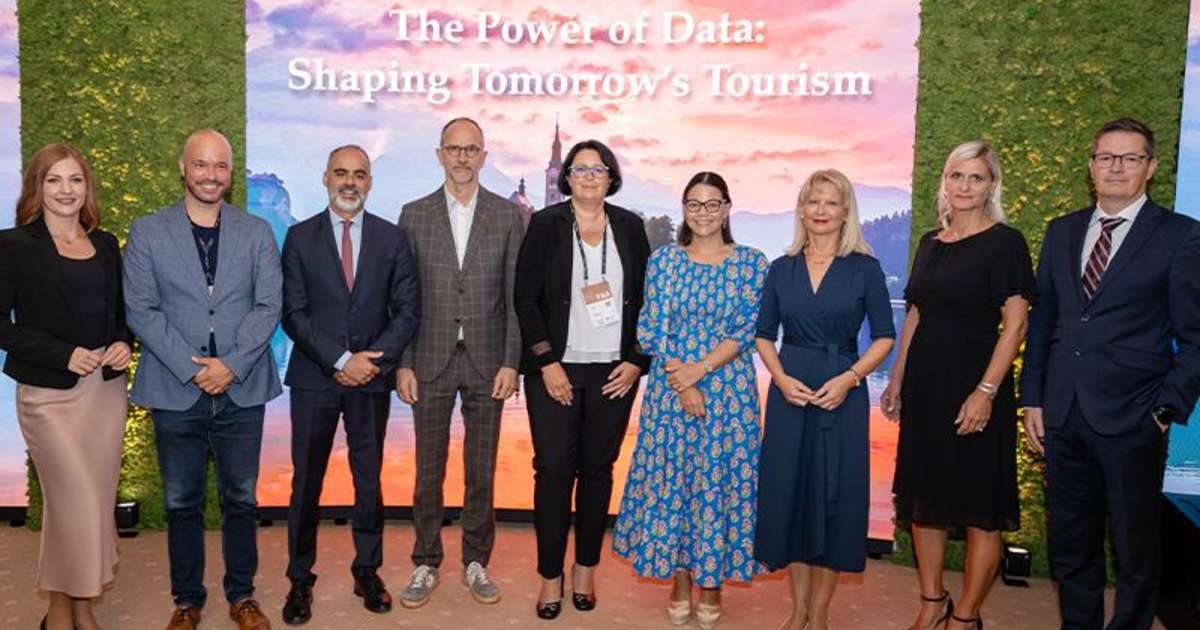
UN Tourism brought its expertise to the Bled Strategic Forum, highlighting the essential role of investments and innovation as drivers of a better future, while also engaging in an official visit to the Ministry of Economy, Tourism and Sport to strengthen collaboration.
The Forum serves is recognized as the top international conference in Central and South-Eastern Europe, offering a platform to explore ideas on modern society and its future. Joining leading public and private sector policymakers and thinkers at the event, UN Tourism Executive Director Natalia Bayona made clear how the sector can continue to adapt and so drive inclusive and sustainable development, both across the region and globally.
Education and investments to drive change
As part of a special panel discussion on the power of data in tourism transformation, Ms Bayona highlighted the importance of rethinking education and training as a key step towards transforming the sector. By equipping the workforce with digital skills, we can address challenges such as seasonality and overcrowding, while fostering smart, sustainable destinations, she said.
At the same time, UN Tourism also made clear the need for more and better-targeted investments into the sector, noting that this is already driving positive transformation and supporting the shift towards greater sustainability. Over the past five years alone, $48 billion in venture capital has been invested in tourism technology. Together, innovation and education have the power to transform the industry, Ms Bayona concluded.
Strengthened collaboration with Slovenia
Within the framework of the Bled Strategic Forum UN Tourism commended Slovenia for its work promoting sustainable tourism as well as its remarkable record of attracting investments into the sector. The possibilities for further collaborations informed UN Tourism’s meeting with the country’s Minister of the Economy, Tourism and Sport Matjaž Han, most notably shared plans to boost private investments.
During the visit to the Ministry of Economy, Tourism and Sport ,the UN Tourism delegation also advanced ideas for closer collaboration in the field of tourism education. A meeting with the Dean and other key academic staff of the School of Economics and Business of the University of Ljubljana explored the possibility of shared initiatives through the UN Tourism Online Academy, as well as the chance to offer Slovenian students international experience, whether through research placements and internships or online courses.
Related links:
About UN Tourism
The World Tourism Organization (UN Tourism) is the United Nations agency responsible for the promotion of responsible, sustainable and universally accessible tourism.
As the leading international organization in the field of tourism, UN Tourism promotes tourism as a driver of economic growth, inclusive development and environmental sustainability and offers leadership and support to the sector in advancing knowledge and tourism policies worldwide.
Our Priorities
Mainstreaming tourism in the global agenda: Advocating the value of tourism as a driver of socio-economic growth and development, its inclusion as a priority in national and international policies and the need to create a level playing field for the sector to develop and prosper.
Promoting sustainable tourism development: Supporting sustainable tourism policies and practices: policies which make optimal use of environmental resources, respect the socio-cultural authenticity of host communities and provide socio-economic benefits for all.
Fostering knowledge, education and capacity building: Supporting countries to assess and address their needs in education and training, as well as providing networks for knowledge creation and exchange.
Improving tourism competitiveness: Improving UN Tourism Members’ competitiveness through knowledge creation and exchange, human resources development and the promotion of excellence in areas such as policy planning, statistics and market trends, sustainable tourism development, marketing and promotion, product development and risk and crisis management.
Advancing tourism’s contribution to poverty reduction and development: Maximizing the contribution of tourism to poverty reduction and achieving the SDGs by making tourism work as a tool for development and promoting the inclusion of tourism in the development agenda.
Building partnerships: Engaging with the private sector, regional and local tourism organizations, academia and research institutions, civil society and the UN system to build a more sustainable, responsible and competitive tourism sector.
Our Structure
Members: An intergovernmental organization, UN Tourism has 160 Member States, 6 Associate Members, 2 Observers and over 500 Affiliate Members.
Organs: The General Assembly is the supreme organ of the Organization. The Executive Council take all measures, in consultation with the Secretary-General, for the implementation of the decisions and recommendations of the General Assembly and reports to the Assembly.
Secretariat: UN Tourism headquarters are based in Madrid, Spain. The Secretariat is led by the Secretary-General and organized into departments covering issues such as sustainability, education, tourism trends and marketing, sustainable development, statistics and the Tourism Satellite Account (TSA), destination management, ethics and risk and crisis management. The Technical Cooperation and Silk Road Department carries out development projects in over 100 countries worldwide, while the Regional Departments for Africa, the Americas, Asia and the Pacific, Europe and the Middle East serve as the link between UN Tourism and its 160 Member States. The Affiliate Members Department represents UN Tourism’s 500 plus Affiliate members.
UN Tourism Communications Department
+34 91 567 8100
UN Tourism
Please visit:
Our Sponsor
